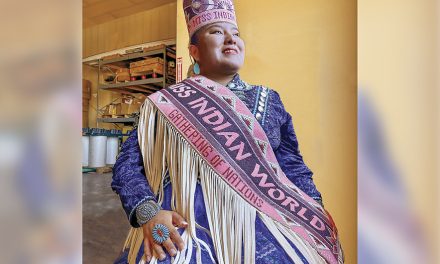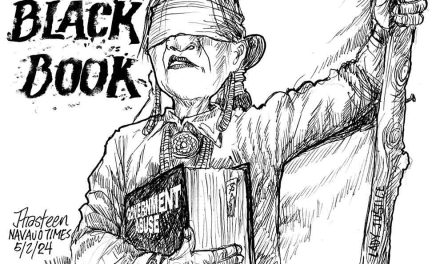
Letters | Native tribes need to take action on ‘Azee’ Diyin
Editor,
The present time is critical for the natural wild growing peyote cactus plants (“Ázeé Diyin” or “lophophora williamsii”) in Texas and Mexico, which is the Native American Church’s (NAC) (or “Azee’ Bee Nahagha’ of Diné Nation”) sacred sacrament herbal medicine.
Peyote has healed and helped numerous suffering people via the NAC fireplace. Natural peyote is considered divine containing a spirit while the mescaline chemical extract is not divine.
Hospitals compassionately prescribe mescaline, as well as other psychedelics or psychotrophic drugs, to assist terminally ill patients face death and treat severe depression.
Native American religious use of peyote became legal under federal law in 1978 (42 USC §1996a amended in 1994). In 1992, without Congressional approval or input from sovereign Indian Nations, a federal district court interpreted the “federal peyote exemption” law, 21 C.F.R. §1307, as protecting all NAC members regardless of race (U.S. v. Boyll, 774 F. Supp. 1333).
As a result, false rogue NAC groups have emerged who use marijuana and other illicit drugs together with peyote (e.g. Oklevueha NAC of Hawaii v. Holder, 676 F.3d 829). Other courts have followed the Boyll decision as precedent such as in the State of Utah v. Mooney, 2004 UT 49, criminal case. However, the Utah NAC swiftly lobbied the Utah State legislature to pass a law that limit religious use of peyote to members of American Indian tribes.
Anyone can become an instant NAC member on the internet by paying a fee that allows them to consume peyote. Peyote possession and use is decriminalized in the states of Colorado, Oregon, and various California cities.
In Mexico, tour companies frequently take large tourist groups to the peyote gardens specifically to ingest peyote recreationally, which has quickly depleted peyote in its natural habitat. The wild growing peyote population is destroyed by large scale mining, farming, and other harmful activities in Mexico.
Commercial peyote cream and gel mixed with cannabis products are mass produced in Mexico. In 2002, concerned Mexican Indigenous tribes urged the Mexican government to promulgate a law (NOM-059-SEMARNAT-2002) that classified peyote as a threatened and protected species. Such law prohibits exportation of Mexican peyote by foreigners including NAC members.
In the United States, the Texas peyote gardens are threatened by massive land development projects, global warming, too frequent and repeated harvesting, and illegal poaching. Ongoing longitudinal scientific research studies confirm that peyote is indeed depleting and disappearing at an alarming rate.
Supply and demand is at the heart of this crisis. Thus, scientists strongly encourage NAC members to construct greenhouses now to grow peyote locally to prepare for the future. NAC has often been resilient to successfully overcome enormous obstacles and challenges.
It is imperative that NAC join hands with Canadian First Nations and Mexican Indigenous tribes to take action locally, nationally, and internationally to preserve and protect peyote for future generations.
James D. Muneta
Tohatchi, N.M.
Gentleman seeks to return sweater to good Samaritan
Editor,
Last night (Oct. 24, 2023) in Sky Harbor (International) Airport, my wife and I met a pleasant Navajo lady. My wife was trying to navigate two wheelchairs, and this woman volunteered to push me so that my wife could concentrate on moving her mother.
As she wheeled me through the airport, this lady related that she had been in the Washington, DC area to visit a cousin who was in a Navy Hospital ICU. The cousin, she said, had been in the Navy for twenty-three years. She went on to relate that the cousin’s mother lived on the reservation and spoke little English.
The woman went on to say that she spends summers in Albuquerque and winters in the Phoenix area. By then, she had wheeled me all the way to the sidewalk. I thanked her for her help, and she headed to the far side of the airport to meet her daughter.
I did not get her name and I doubt she heard more than my first name. Once she was out of sight, my wife discovered that this helpful woman had left her sweater on the back of my wheelchair.
I do not know whether the information I have given you is enough for anyone to make the connection, but if I could make contact with this woman, I would gladly drive as far as necessary to deliver her sweater, or conversely would mail it to her.
What are the chances?
Jim Mingo
Apache Junction, Ariz.








 Highway 264,
Highway 264, I-40, WB @ Winslow
I-40, WB @ Winslow